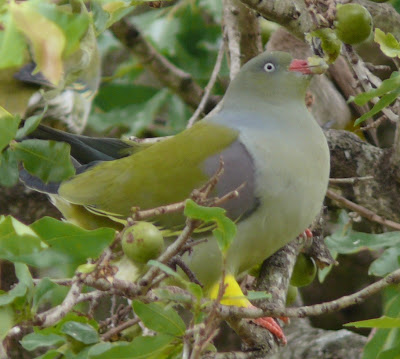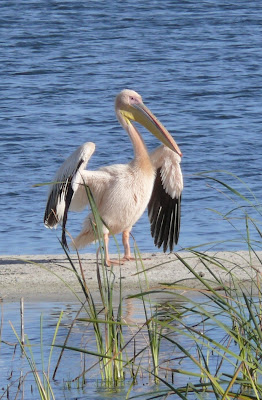 Just a quick pic I snapped at my parent's house in Pennsylvania. A Hairy Woodpecker is the larger bird on the left, and the smaller bird on the right is a Downy Woodpecker. As you can see, the two species are almost identical except for the size. My mom came up with an easy way to remember it though. Downys are Diminutive, and Hairys are Huge. Hope that helps you remember, and have a happy new year!
Just a quick pic I snapped at my parent's house in Pennsylvania. A Hairy Woodpecker is the larger bird on the left, and the smaller bird on the right is a Downy Woodpecker. As you can see, the two species are almost identical except for the size. My mom came up with an easy way to remember it though. Downys are Diminutive, and Hairys are Huge. Hope that helps you remember, and have a happy new year!
Monday, December 29, 2008
Downy and Hairy Woodpeckers
 Just a quick pic I snapped at my parent's house in Pennsylvania. A Hairy Woodpecker is the larger bird on the left, and the smaller bird on the right is a Downy Woodpecker. As you can see, the two species are almost identical except for the size. My mom came up with an easy way to remember it though. Downys are Diminutive, and Hairys are Huge. Hope that helps you remember, and have a happy new year!
Just a quick pic I snapped at my parent's house in Pennsylvania. A Hairy Woodpecker is the larger bird on the left, and the smaller bird on the right is a Downy Woodpecker. As you can see, the two species are almost identical except for the size. My mom came up with an easy way to remember it though. Downys are Diminutive, and Hairys are Huge. Hope that helps you remember, and have a happy new year!
Wednesday, December 10, 2008
South African Birding (continued)
Birding Kruger Park!
This is the 3rd posting of pictures of our birding trip to South Africa with Nestling Tours and Avian Leisure. Included here are photos from traveling through the regions known as the Tanqua Karoo, the Langeberg Mountains, the west coast, the Agulhas Plain, the Grootvadersbosch Forest, the Gargen Route, and the famous Kruger Park.
Pictures here are a few of 348 species we observed and photographed, many of which are endemic. My traveling companion Bill Eden and I found pristine bio diverse environments rich in bird, insect, floral, and the highly sought after "big five mammals." We were fortunate to see African Elephants, Cape Buffaloes, Rinos, Lions, and Cheetas. We did miss out on the Leopard. Maybe next time.
All posted pictures taken with a Leica V Lux 1 camera.

Yellow-Billed Stork catches a fish. Just as I pressed the shudder.

Stripped Kingfisher in Kruger Park
Spotted Thick-Knee

Southern Yellow-Billed Hornbill

Southern Masked Weaver

 Secretarybird
Secretarybird
Scarlet-Chested Sunbird
This is the 3rd posting of pictures of our birding trip to South Africa with Nestling Tours and Avian Leisure. Included here are photos from traveling through the regions known as the Tanqua Karoo, the Langeberg Mountains, the west coast, the Agulhas Plain, the Grootvadersbosch Forest, the Gargen Route, and the famous Kruger Park.
Pictures here are a few of 348 species we observed and photographed, many of which are endemic. My traveling companion Bill Eden and I found pristine bio diverse environments rich in bird, insect, floral, and the highly sought after "big five mammals." We were fortunate to see African Elephants, Cape Buffaloes, Rinos, Lions, and Cheetas. We did miss out on the Leopard. Maybe next time.
All posted pictures taken with a Leica V Lux 1 camera.

Yellow-Billed Stork catches a fish. Just as I pressed the shudder.

Stripped Kingfisher in Kruger Park
Spotted Thick-Knee

Southern Yellow-Billed Hornbill

Southern Masked Weaver

 Secretarybird
SecretarybirdScarlet-Chested Sunbird
Long-Crested Eagle
Thursday, November 20, 2008
South Africa Birding
It's mid November and my traveling companion Bill Eden and I have recently returned from a birding/wildlife photographic safari in South Africa. Our trip took us over much of the country ranging from the pristine surrounding of Cape Town, the off shore pelagic environment of the Cape of Good Hope, along the Atlantic seaboard, the inland arid land known as the Great Karoo, the succulent forest and rugged mountains of the Cape peninsula garden route, and the internationally acclaimed Kruger Park. Our host and guides Patrick and Marie-Louise Cardwell of Avian Leisure present the country to us and deliver over 350 species of birds, many of which are endemic. Along the way we observed and photographed a wide range of wildlife in the incredible South African varied bio-diverse landscape.
The first few days of our trip are in and around the small coastal community of Simons Town. It is situated just about 10 miles north of the Cape of Good Hope on the western shore of what is known as False Bay. Bill and I explore and photograph birds in the Cape Peninsula, the Cape Point Nature Reserve, Boulders Coastal Park, the Kirstenbosch Botanical Gardens, the Cape of Good Hope Park, and the Strandfontein wetlands. All pictures taken with Leica C-Lux and V-Lux cameras and all digiscope shots are with a Swarovski spotting scope and a Cannon 540 point and shoot camera.
The first few days of our trip are in and around the small coastal community of Simons Town. It is situated just about 10 miles north of the Cape of Good Hope on the western shore of what is known as False Bay. Bill and I explore and photograph birds in the Cape Peninsula, the Cape Point Nature Reserve, Boulders Coastal Park, the Kirstenbosch Botanical Gardens, the Cape of Good Hope Park, and the Strandfontein wetlands. All pictures taken with Leica C-Lux and V-Lux cameras and all digiscope shots are with a Swarovski spotting scope and a Cannon 540 point and shoot camera.
South African Pelagic Birding
Africa Trip continued:
 A big part of our S. A. birding and wildlife tour was a 30 mile excursion off the Cape of Good Hope. Patrick Cardwell of Avian Leisure hooks us up with Chris Fallows of Apex Predators tours (http://www.apexpredators.com) in order to view the wide array of seabirds and other wildlife that forage off the bottom of the African continent.
A big part of our S. A. birding and wildlife tour was a 30 mile excursion off the Cape of Good Hope. Patrick Cardwell of Avian Leisure hooks us up with Chris Fallows of Apex Predators tours (http://www.apexpredators.com) in order to view the wide array of seabirds and other wildlife that forage off the bottom of the African continent.
Chris and Apex Predators are internationally acclaimed with their pictures, interviews, and documentaries seen in National Geographic, 60 minutes, CNN, and the Discovery Channel. You can see Chris’s awesome videos of Great White Sharks in pursuit of sea lions in the Discovery Channel‘s Planet Earth series. They specialize in the conservation of aquatic ecosystems to include promoting the positive awareness of the Great White Sharks.
We did not chase Great Whites, but the thrill of riding 25 foot waves photographing a mix of Shearwaters, Petrels, Skuas, Albatross’s and Gulls was quite a treat. To add to the adventure were sea turtles, sun fish, sea lions, and breaching Southern Right Whales.
The rough seas where the Atlantic and Indian oceans meet did smooth out a bit as we powered our 18’ craft past the continental shelf. There we played tag with several fishing trawlers and container ships that attracted prolonged aquatic feeding frenzes. These were the same seas back in 1487 that the Portuguese explorer Bartholomeu Dias ventured through as he rounded the Cape in search of an eastern sea trade route to India. Dias did not make it to India but 10 years later in 1497 the equally intrepid adventurer Vasco da Gama did which started a rich history that the Portuguese, Dutch, and English all played a part in. The windy, rocky cape was and is a dangerous place for seamen and many met their demise here including tragically Dias himself.
Please enjoy these pelagic pictures and short videos. Photographs are from a Leica D-Lux unless otherwise noted.
 Cape Gull digiscoped with Cannon 540 and Swarovski HD 80 scope
Cape Gull digiscoped with Cannon 540 and Swarovski HD 80 scope

A Sun Fish approaches our boat

 A big part of our S. A. birding and wildlife tour was a 30 mile excursion off the Cape of Good Hope. Patrick Cardwell of Avian Leisure hooks us up with Chris Fallows of Apex Predators tours (http://www.apexpredators.com) in order to view the wide array of seabirds and other wildlife that forage off the bottom of the African continent.
A big part of our S. A. birding and wildlife tour was a 30 mile excursion off the Cape of Good Hope. Patrick Cardwell of Avian Leisure hooks us up with Chris Fallows of Apex Predators tours (http://www.apexpredators.com) in order to view the wide array of seabirds and other wildlife that forage off the bottom of the African continent.Chris and Apex Predators are internationally acclaimed with their pictures, interviews, and documentaries seen in National Geographic, 60 minutes, CNN, and the Discovery Channel. You can see Chris’s awesome videos of Great White Sharks in pursuit of sea lions in the Discovery Channel‘s Planet Earth series. They specialize in the conservation of aquatic ecosystems to include promoting the positive awareness of the Great White Sharks.
We did not chase Great Whites, but the thrill of riding 25 foot waves photographing a mix of Shearwaters, Petrels, Skuas, Albatross’s and Gulls was quite a treat. To add to the adventure were sea turtles, sun fish, sea lions, and breaching Southern Right Whales.
The rough seas where the Atlantic and Indian oceans meet did smooth out a bit as we powered our 18’ craft past the continental shelf. There we played tag with several fishing trawlers and container ships that attracted prolonged aquatic feeding frenzes. These were the same seas back in 1487 that the Portuguese explorer Bartholomeu Dias ventured through as he rounded the Cape in search of an eastern sea trade route to India. Dias did not make it to India but 10 years later in 1497 the equally intrepid adventurer Vasco da Gama did which started a rich history that the Portuguese, Dutch, and English all played a part in. The windy, rocky cape was and is a dangerous place for seamen and many met their demise here including tragically Dias himself.
Please enjoy these pelagic pictures and short videos. Photographs are from a Leica D-Lux unless otherwise noted.

all of Africa is above here
 Cape Gull digiscoped with Cannon 540 and Swarovski HD 80 scope
Cape Gull digiscoped with Cannon 540 and Swarovski HD 80 scope
Who's on first?

Sea Lions on the chase

The Shy Albatross
Incredible aviators, Albatross's play the waves
A Sun Fish approaches our boat

Our Sun Fish pulls up along side the boat
Check out the rockin video!
Subscribe to:
Comments (Atom)




.JPG)




























 Cape Sugarbirds
Cape Sugarbirds
 African Black Oystercatcher
African Black Oystercatcher nesting Cape Cormorant digiscoped with Swarovski scope & Cannon 540
nesting Cape Cormorant digiscoped with Swarovski scope & Cannon 540 Moon over S. A. digiscoped with Swarovski scope & Cannon 540
Moon over S. A. digiscoped with Swarovski scope & Cannon 540











